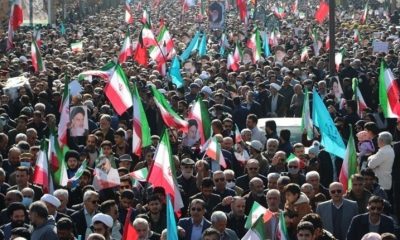Islam
Iran’s inherent enmity towards Israel and its rejection of Zionism
In 1917, when World War I was coming to an end, Lord Balfour, the British Foreign Secretary, announced to the world the Balfour Declaration, which provided the necessary legal and political groundwork for the formation of an independent Jewish state in Palestine under British protection. After 1918, the League of Nations placed Palestine under British mandate and committed to governing it in a way that would create the conditions for the establishment of an independent state while safeguarding the rights of Palestinians. However, under pressure from Jewish interests, Britain gradually allowed more Jewish immigrants into this land. On May 15, 1948, as British forces left Palestine, the Israeli regime declared its independence. This marked the beginning of an occupier regime in a land originally inhabited by Palestinians. Subsequently, Jewish settlers in these areas utilized various tactics such as promoting Jewish immigration from around the world, violence against Muslim Arabs, purchasing Palestinian lands, and more. Iran, despite its extensive and active involvement in various international organizations, including the United Nations, did not take constructive action regarding the Palestinian issue, as expected for a matter concerning the Islamic world. After Israel declared existence in Palestine in April 1948, Iran’s political positions gradually shifted. The Pahlavi regime, under the influence and pressure from powerful entities, particularly the United States, began to distance itself from Palestinians. From the inception of the Zionist regime, its foreign and security policy has been based on distorted religious ideologies, strategies for territorial expansion, settlement construction, overcoming internal challenges and divides, and ultimately realizing the grand Israeli vision, contrary to traditional Jewish beliefs, of establishing a Jewish state even before the arrival of the Messiah. Now, more than 60 years after the formation of this regime and enduring multiple wars, particularly the 33-day war, and addressing internal divides and public demands for achieving security, Israeli officials have decided to change their foreign and security policies to attain lasting security. This transformation includes the regime’s decision to withdraw from occupied territories, define borders, and amend regional strategies instead of occupation, control, and suppression. This transformation will undoubtedly have consequences and effects on the region and Iran. While historic Palestine has been home to numerous nations and ethnicities and hosted divine prophets, including Jews and Prophet Moses, throughout history, differences, and divisions among Jews, except during the leadership of Prophets David and Solomon, were evident. Recent centuries witnessed a new approach, contrary to traditional Jewish beliefs, advocating for the establishment of a Jewish state and return to the Promised Land even before the arrival of the Messiah. Following the division of Palestine into Jewish and Arab sections in 1947, changes occurred in Iran as well. At that time, due to political turmoil and economic challenges, Iran sought closer ties with the United States as a new emerging power in the region. Iranian leaders saw closer relations with the United States as a solution to their economic and political challenges. Consequently, some Iranian government officials leaned towards endorsing the Zionist regime. This was when Iran was facing numerous economic and political difficulties, and it was looking to the United States with great hope. For these reasons, Iranian authorities moved closer to the United States. Israel, due to the extraordinary influence of the Zionist lobby in the United States, held a unique position and credibility among American policymakers, making closer ties with Israel essentially equivalent to closer ties with the United States. While there may be various reasons for Iran and Israel’s strategic proximity in the region, some prominent factors played a more significant role:
– Israel’s exit from political isolation in the region and the alignment of two regimes with the West.
– Fear of communism and the former Soviet Union.
– Encirclement of Arab countries by non-Arab nations like Iran and Turkey.
– Control of the free energy flow from the Persian Gulf and the economic benefits, primarily benefiting Israel.
With the establishment of the state of Israel in 1948 CE (1327 SH), the issue of Palestine became one of the major concerns in the Islamic world. Among Islamic countries, Iran held a special position due to its unique characteristics. The Palestine issue transformed into a major political and religious concern, not only for political and religious entities but also for the entire global community. Beyond the stances of political and religious entities, Iranian governments had two distinct approaches to this issue. In the first approach, which exhibited neutral and indifferent positions, one can refer to the era of Mohammad Reza Shah Pahlavi. In the second approach, where attention was paid to the issue and actions were taken, one can mention the governments of Seyyed Hassan Modarres and Mohammad Mossadegh.
The Islamic Revolution in Iran led to a significant change in the country’s foreign policy outlook and its emergence on the international stage. Iran’s inherent enmity towards Israel and its rejection of Zionism constitute the core of Iran’s foreign policy, views explicitly expressed by Iranian intellectuals concerning Israel. These attitudes are within the ideological framework and political reality of Iran.
Iran and Israel pose security and ideological challenges to each other. Israel’s concerns about Arab uprisings may work in Iran’s favor and increase Iran’s regional influence. Supporting the Muslim nation of Palestine is not only considered the defense of an Islamic land but also a means to prevent the expansion of Israel’s threats and protect Iran’s national interests. In general, Iran’s foreign policy objectives align with the goals outlined in the Iranian Constitution: safeguarding national independence and sovereignty in the international arena, defending the rights of Muslims, supporting the oppressed against the oppressors, and supporting liberation movements (Article 133, Article 154, striving to form a united global Muslim community, etc.).
The land of Palestine, as the first Qibla (direction of prayer) for Muslims, holds spiritual and strategic significance. It is crucial to protect and defend it. In summary, the objectives of Iran’s foreign policy are rooted in its constitutional principles, and Palestine, as the first Qibla, holds sacred and strategic importance.

You may like
-


Iranian People Unite to Condemn Rioters, Defend Islamic Republic
-


‘Israel is always looking for a new war against Hezbollah’
-


‘Terrorism—the intentional targeting of innocent civilians—is incompatible with jihad’
-


‘Islamophobes perpetuate the myth that Muslims are plotting to overtake the West’
-


‘BDS will grow as Western continue their craven subservience to Israel’
-


SURA 98. Baiyina, or The Clear Evidence


Iranian People Unite to Condemn Rioters, Defend Islamic Republic

Fact Check: Did Iran Introduce a $7 Payment to Quell Recent Unrest?

‘Israel is always looking for a new war against Hezbollah’

‘Terrorism—the intentional targeting of innocent civilians—is incompatible with jihad’

‘Islamophobes perpetuate the myth that Muslims are plotting to overtake the West’

‘Terrorism—the intentional targeting of innocent civilians—is incompatible with jihad’

Fact Check: Did Iran Introduce a $7 Payment to Quell Recent Unrest?

Iranian People Unite to Condemn Rioters, Defend Islamic Republic

‘Israel is always looking for a new war against Hezbollah’

Trump’s Worst Nightmare: How a Muslim Mayor Is Reshaping New York—and Challenging the Status Quo

Italian journalist participates in Arbaeen, Iraq

Qisas In Islam

Since the start of 2024; info motion

Quince, Iranian Traditional Medicine (ITM)

